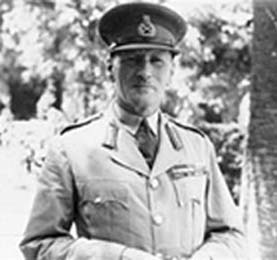graduate of the Japanese Military Academy and the War College, was appointed to lead the Japanese 18th Army in November 1942, a command which he retained until the end of the war; led the fighting to retain New Guniea, commanding forces retreating to Buna, Sio and then to Madang against General MacArthur's forces, which finally pinned down the 18th Army at Wewak in mid-1944; committed suicide in September 1947, an act which demonstrated his acceptance of personal responsibility for war crimes charged to his subordinates at the Rabaul prison camp.
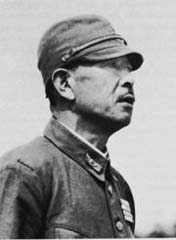
Canadian-born newspaper owner and politician and long-standing friend of Winston Churchill; despite a wilful, driven personality which often aroused disagreement and suspicion, was appointed by Churchill to lead the newly created Ministry of Aircraft Production in mid-1940; criticism of his appointment was silenced by his success in achieving and beating production targets for desperately needed fighter aircraft during the Battle of Britain; received great credit fo the trebling of fighter output between May and August 1940, although the mechanism for the improvements was already in place when he arrived; his undoubtedly energetic but roughshod approach to the process of reorganization also led to serious shortfalls in the production of other aircraft types, which proved damaging in 1941; other appointments held: Minister of Supply; Lord Privy Seal; and British Lend-Lease administrator in the US.
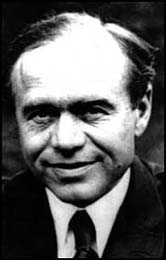
one of the most respected and successful British military leades of the war, had entered the Army in 1911, rising rapidly to become a lieutenant colonel in 1918; at the start of the war commanded the 1st Division of the BEF, enhancing his reputation by his handling of the rearguard at Dunkirk; was subsequently promoted to command 1st Corps, and in December 1940 trasferred to Southern Command, where he wond Churchill's confidence; in March 1942, flew to Burma as the Japanese invasion armies advanced on Rangoon; unable to hold the Burmese capital, fulfilled his prime objective in directing Lt General Slim's lengthy tactical withdrawal from Burma into India; in August 1942, succeeded to yet another command in crisis when he replaced Auchinleck as C-in-C, Middle East; his partnership with 8th Army commander Montgomery in the Desert War was highly successful; while the success owed much to Auchinleck's well organized defenses at El Alamein, to Montgomery's tactical flexiblility and to the enormous disparity in strength between the two sides, deserves credit for the supply and support he made available to Montgomery; in February 1943, as Allied armies converged on Tunisia, was given operational control of all ground forces in the theater as Comander 18th Army Group and Supreme Allied Commander Eisenhower's deputy; in this capacity, oversaw the final conquest of North Africa, and subsequently the Allied invasions of Sicily and Italy; of all the major campaigns which he directed during the war, the Allied campaign in Italy was the most blighted and frustrating of his career; disadvantaged from the outset by a lack of Allied consensus over the strategic worth and status of the campaign, the Allied effort in Italy was also hampered by poor choice of landing sites, and the exceptional tactical defense directed by overall German commander in Italy, Field Marshal Kesselring; during 1944, his progress was also hindered by the loss of forces, equipment, and many of his most experienced field commanders to Britain, in preparation fo the projected invasion of Normandy, scheduled for the late spring; but it is arguable that, as 1944 wore on, Alexander's and Churchill's arguments for renewed offensives to break the stalemate on the Italian peninsula, in preference to a diversionary landing in the south of France (favored by the US service chiefs), were less and less well-founded; clearly, both were unwilling to lose the opportunity to ensure a major, and largely British, victory in the Mediterranean theater; the capitulation of Rome to the Allies on June 4, 1944 was an encouraging, if largely symbolic achievement; was promoted to Field Marshal in recognition of his service; when Eisenhower was transferred to London as Supreme Commander Allied European Forces to supervise the invasion of Northwest Europe, he requested that Alexander - a sure-footed military diplomat - accompany him; this was vetoed by Churchill, however, and he remained in command of the 15th Army Group in Italy until December 1944, when he was appointed Supreme Allied Commander in the Mediterranean theater; on April 29, 1945 accepted the German surrender in Italy; after the war, served as Governor-General of Canada, then as Minister of Defense in Churchill's second government in 1952; was created Earl Alexander of Tunis in that year.
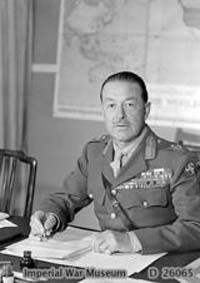
Polish military commander, captured with his retreating army by the Russians at the fall of Poland in September 1939; was imprisoned in the Lubianka after his refusal to join the Red Army (a choice made by many Polish soldiers), but was released in 1941 as part of an agreement between Russia and the Polish government-in-exile forced by the German invasion of Russia; was given permission to trace and recruit Polish POWs held in Russian labor camps; subsequently arranged the evacuation of nearly 160,000 men to Persia (Iran) and Palestine, where they were trained by British military staff and later integrated into the British 8th Army as the 2nd Polish Corps; landed in Italy as part of the 8th Army's invasion force in September 1943, the 2nd Corps fought with particular distinction, most notably at Monte Cassino, which was captured at enormous cost in casualties after three attempts by other units had failed; then led 2nd Corps in the battles up the Adriatic coast and in the clearance of the Po valley; after the German surrender in 1945 was appointed C-in-C of the Polish Army by the Polish government-in-exile, though 'Anders Army' itself was now a political embarrassment to the United States and Britain in their relations with Russia and was therefore disbanded; moreover, his loyalty to Stanislaw Mikolajczyk, Prime Minister of the exiled government, made his return to post-war Poland impossible; thus, most of Anders' demobilized troops chose, like Anders himself, to settle in western Europe; of 112,000 men, only 80 officers and less then 20,000 troops returned home; in the years following the war, he increasingly became a national figure and political focus for Polish exiles in Britain; remained so until his death in 1970.
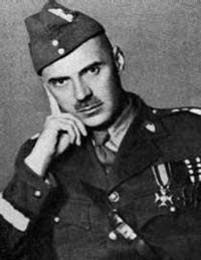
British soldier who commanded a division during the British Army's evacuation of Dunkirk in June, 1940; two years laters, as a Lt-General, was chosen to command the Allied 1st Army for the campaigns in Northwest Africa; afterh the Axis surrender in Tunisia, was given command of the 2nd Army in preparation for the Allied invasion of Normandy, but was replaced by Lt-General Dempsey before it took place; after a spell in home commands became C-in-C, East Africa in 1945; served as Governor of Gibraltar from 1947-1952 and was promoted full general in 1949.
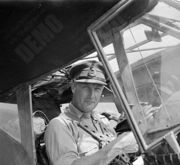
served as Minister of Defense in 1934 and Chief of General Staff in 1937 in the dictatorial regime of King Carol; his association with the Iron Guard landed him in prison for conspiracy against the pro-French government in 1938; restored to favor after the collapse of France in June 1940, was named Prime Minister on September 4, 1940; enjoyed considerable support initially as he modelled himself on the Fascism of Mussolini rather than the aggressive style of the Nazis; with the promise of Russian territories, 30 Rumanian divisions took the field in June 1941 against the Soviet Union; standing declined with failing German fortunes and mounting Rumanian casualties on the Eastern Front; when Soviet forces began their advance into Rumania on August 20, 1944, Stalin's peace overtures paid off and on August 23 the regent, Prince Michael, led a coup d'etat in Bucharest and imprisoned Antonescu's cabinet; Rumania changed sides at once and eventually committed 150,000 men to fighting against the Axis; was later sentenced to death by the Russians and executed as a collaborator on June 1, 1946.
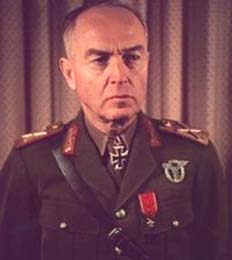
Red Army officer who commanded the Transcaucasian Front in 1941-2, before being appointed General Vasilevsky's representative in Moscow2; posted as GHQ representative on the Voronezh Front by Stalin, with whom he was apparently not popular, his service there led to his promotion as Deputy Chief of the General Staff and Operations Chief, with orders to act as liaison between Stalin and the front commanders; deputizing for Vasilevsky during his frequent absences, directed the preparation of Operation Bagration and the final Russian offensive against Berlin; in 1944 was chief Russian spokesman at the Allied Conferences in Moscow and later Potssam; was appointed Chief of the General Staff in April 1945.
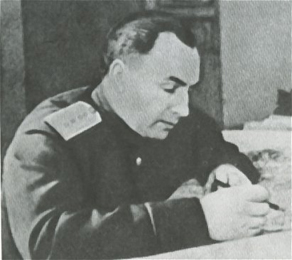
a cousin of the King of Italy, was Governor-General of Italian East Africa and Viceroy of Ethiopia in 1940; as C-in-C conducted the Italian campaign in the region, surrendering his surrounded and depeted forces at Amba Alagi on May 17, 1941; was imprisoned by the British in Nairobi, Kenya, where he died in 1942.
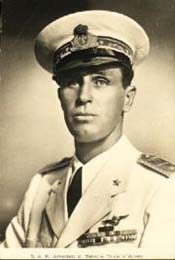
German soldier who commanded a panzer division and later a corps on the Eastern Front in 1941-2; in November 1942, was transferred to take command of Axis forces based on Tunis; the following March assumed overall control of Axis troops in Africa, when Field Marshal Rommel returned to Germany; surrendered his remaining forces to the Allies on May 12, 1943.
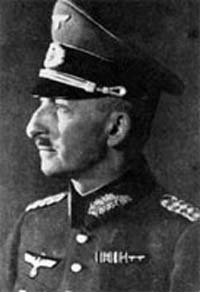
one of the first American military aviators, was taught to fly by the Wright brothers in 1911; commanded the US Army Air Corps in 1938, and was responsible for the Corp's development from less than 25,000 officers and men with 4,000 aircraft, to a great air force comprising two and a half million men and 75,000 aircraft; became Chief of the newly-formed USAAF in June 1941 and Commanding General in March 1942; and enthusiastic champion of aid to Britain and member of the American Joint Chiefs of Staff and Allied Combined Chiefs of Staff throughout the war; was a major Allied decision maker; his insistent support for the Stragegic Bombing Offensive was combined with a great personal involvement with and commitment to the development of the USAAF; when it was granted independent status in 1947, became its first five-star general.
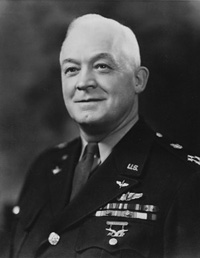
Leader of the British Labor Party from 1935 to 1955 and Churchill's deputy in the wartime coalition government established in May 1940; had a dry and diffident manner which was in contrast to his astute mind and considerable qualities as a statesman; served in the British Army in France and the Middle East during World War I; was elected to Parliament in 1922; was an outspoken opponent of Fascism and of Neville Chamberlain's policy of appeasement; played a crucial role as wartime deputy and in the successful management of labor in the wartime economy; greatest achievements came as Prime Minister between 1945 and 1950, when he initiated the first important steps toward decolonization of the British Empire and the creation of the Welfare State of Britain.
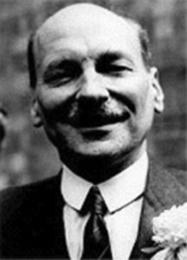
arguably one of the least appreciated British commanders of the war, had been recognized as one of the outstanding officers of his generation during his service with the Indian Army; had become Deputy Chief of Staff at Army HQ at Simla when he was recalled, against establishment convention, to command the British Army IV Corps for the campaign in Norway in 1940; returning to India as C-in-C in early 1941, was chosen by Churchill to succeed General Wavell as C-in-C, Middle East during a difficult phase of the Desert War; despite growing tension between Auchinleck and Churchill, whose impatience for action in North Africa was at odds with the general's pragmatic and careful approach, succeeded in enforcing the Crusader offensive in November; the following June he halted the collapse of the British 8th Army after Gazala, stabilizing the front at Alamein and laying the groundwork for Montgomery's subsequent success; removed from his command by Churchill and replaced by General Alexander immediately after his important victory, turned down command of Persia and Iraq and returned to India, again becoming C-in-C in June 1943; from November he played an important role in Southeast Asia Command under Mountbatten, and continued to enjoy the considerable respect of colleagues and subordinates; promoted Field Marshal in 1946, remained in India until after its independence in 1947.
